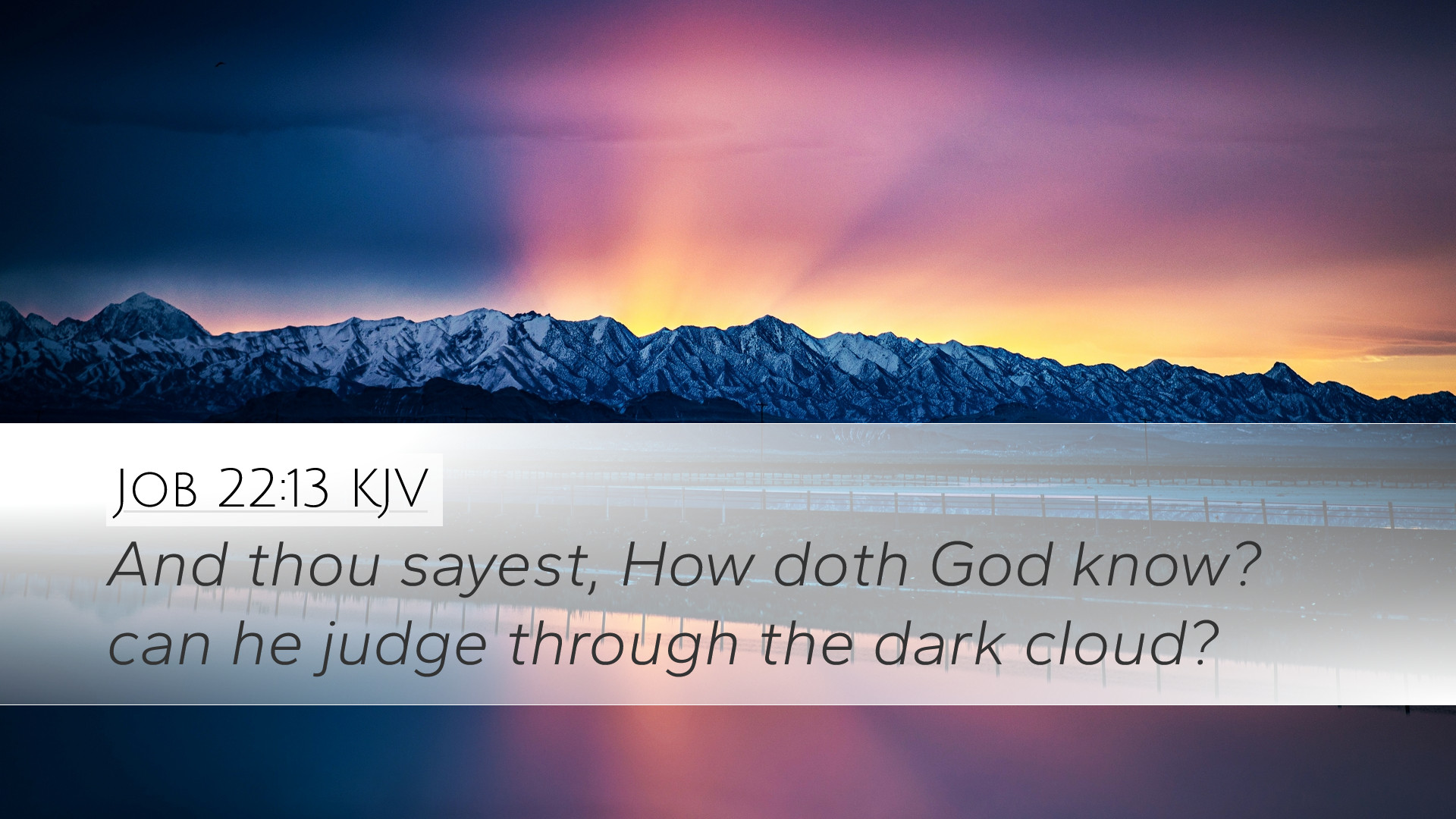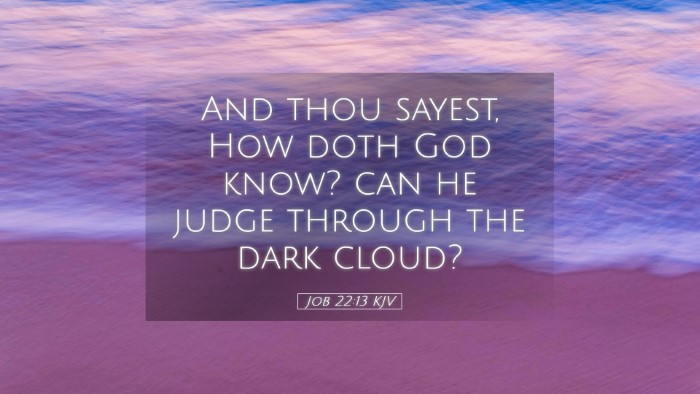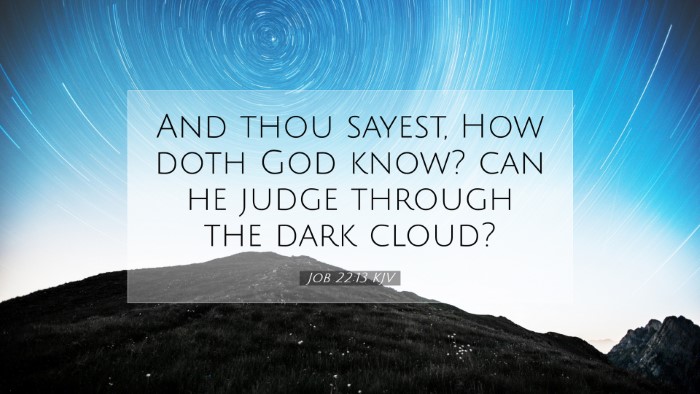Old Testament
Genesis Exodus Leviticus Numbers Deuteronomy Joshua Judges Ruth 1 Samuel 2 Samuel 1 Kings 2 Kings 1 Chronicles 2 Chronicles Ezra Nehemiah Esther Job Psalms Proverbs Ecclesiastes Song of Solomon Isaiah Jeremiah Lamentations Ezekiel Daniel Hosea Joel Amos Obadiah Jonah Micah Nahum Habakkuk Zephaniah Haggai Zechariah MalachiJob 22:13
Job 22:13 KJV
And thou sayest, How doth God know? can he judge through the dark cloud?
Job 22:13 Bible Commentary
Commentary on Job 22:13
Job 22:13 presents an important insight into human perception of God’s nature and the misrepresentation of divine justice. This verse states:
"And you say, 'What does God know? Can He judge through the thick darkness?'" (Job 22:13, ESV)
Contextual Background
The Book of Job addresses profound questions about suffering, justice, and the character of God. Job, a righteous man, endures immense suffering, and his friends debate the reasons behind his plight. Eliphaz, one of Job's friends, speaks in this chapter, representing a conventional wisdom that often misunderstands God's workings.
The Misconceptions of God’s Nature
Eliphaz’s statement reflects a significant misunderstanding regarding God's omniscience and omnipresence. According to Matthew Henry, this verse illustrates the flawed reasoning of assuming that God is ignorant of human actions or disregards justice because of His apparent silence. Henry emphasizes that God's knowledge is comprehensive, extending beyond our limited understanding.
Traditional Views on Divine Judgment
Albert Barnes offers insight into the traditional views held during Job's time regarding divine judgment. He notes that many believed suffering was always a consequence of sin, leading to the assumption that God does not witness or act in the world, especially when it appears unjust. Barnes articulates that such beliefs can diminish the understanding of God's grace and mercy. Instead of portraying God as a distant observer, one must recognize Him as intimately involved in creation.
Eliphaz’s Character and Errors
Eliphaz's remarks in this verse exemplify the errors that stem from human philosophy apart from divine revelation. Adam Clarke comments on Eliphaz's accusation, indicating that it attempts to minimize the comprehensive nature of God's attribute of knowledge. Clarke emphasizes that God’s knowledge is not limited to what is visible or apparent to mankind.
Human Limitations in Understanding God
Alluding to the limitations inherent in human understanding, Henry elaborates that it is easy to assume that God operates under the same constraints that affect humanity. This view leads to questioning God’s providence, especially during times of distress. Clarke reiterates that the darkness perceived in suffering is not indicative of God’s ignorance, but rather a call to deeper faith, as God's plans often extend beyond immediate comprehension.
Theological Implications
This verse raises crucial theological implications concerning the nature of God in relation to humanity's suffering. The denial of God’s omniscience leads to a diminished view of His sovereignty. Barnes argues that believers must recognize that God's purposes often transcend human understanding, and what seems unjust in our limited perspective may be part of an overarching divine plan.
Interpreting Suffering through Faith
Job’s friends, particularly Eliphaz, misinterpret Job's hardships as signs of sin, thus questioning God’s fairness and justice. Clarke states that this kind of reasoning fails to acknowledge the complexity of divine justice, which often includes trials that serve a greater purpose. He encourages believers to interpret suffering through the lens of faith, viewing trials as means for growth rather than as divine punishment.
Conclusion: God’s Sovereignty and Our Response
In summation, Job 22:13 serves as a poignant reminder of the human tendency to misconstrue God’s character and intentions, especially in the face of adversity. Henry concludes by encouraging believers to trust in the goodness and wisdom of God, even when circumstances appear dismal. This trust is essential in fostering a correct understanding of who God is, countering the tendencies to question His oversight and involvement.
Barnes reminds us that acknowledging God’s omniscience leads to a deeper, more robust faith that can withstand the tests of life. Clarke encourages believers to cultivate a relationship with God that thrives on faith and understanding, as they seek to comprehend His sovereign plan through prayer and scripture.
Reflection and Application
As pastors, theologians, and students delve into this verse, it can become an invitation to reflect on personal faith during challenging times. Believers are called not to question God’s knowledge or justice but to seek assurance in His promises, trusting that He knows all and is working for the ultimate good of His creation.


